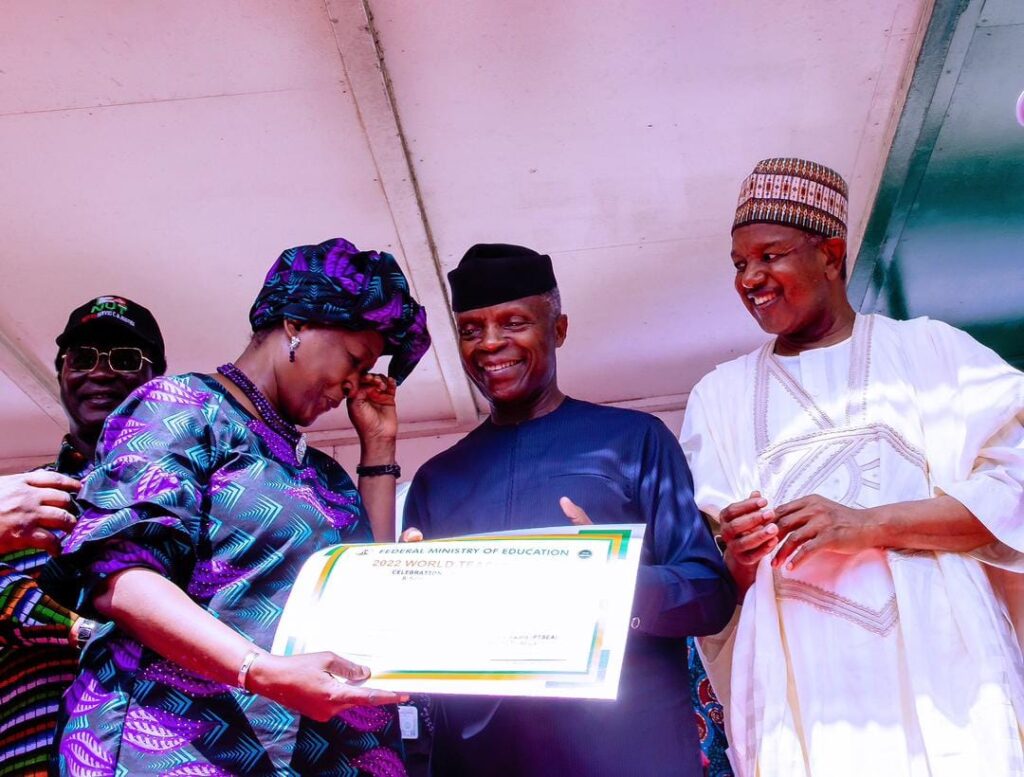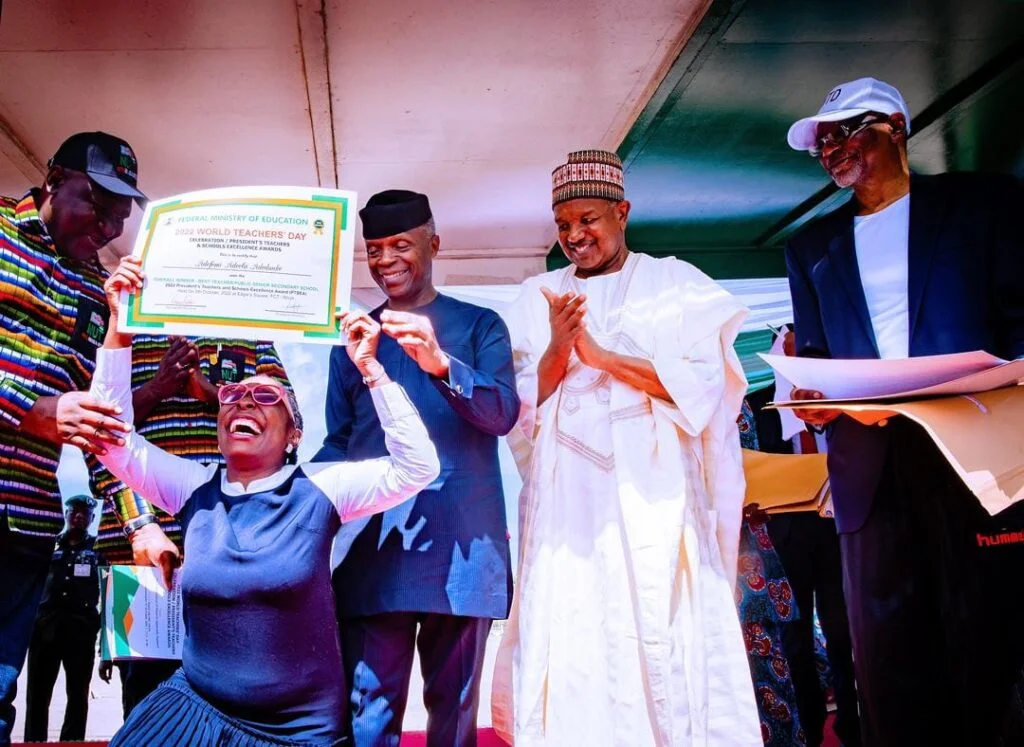…Says no society can grow beyond its educational attainments
Teachers are critical in the transformation and development of a country, and this is why they should harness the power of cutting-edge technology in their work so as to better prepare young people for today’s world.
This was the summation of the speech by Vice President Yemi Osinbajo, SAN, today in commemoration of the World Teachers’ Day at the Eagle Square, Abuja.
Speaking on the theme of this year’s World Teachers’ Day, ‘The Transformation of Education Begins with Teachers,’ Prof. Osinbajo noted that teachers should embrace innovation because they also have an important responsibility to themselves, “for them to be at the cutting edge of advancements in education and especially the use of technology and modern teaching methods.”

Emphasising on the significance of the knowledge economy in global development today, the Vice President said, “Whereas our previous pedagogy inadvertently produced students who were good stores of crammed information, the demands of the future require that we position our young people to think for themselves, to absorb and process the wealth of information available to them, and to tease out useful knowledge.
“Education must respond to the dynamism, speed of development and massive changes in society. Educators must understand the skills required to take full advantage of a world dependent on technology. In addition to listening, education today includes writing, ideation, imagining, and critical thinking skills. It is no longer merely learning by rote,” he added.
While thanking them for their services to the country and its people, the VP who himself was a teacher for 40 years since 1981 urged teachers to continue to “plug themselves into the global knowledge pool”

According to him, teachers should “reach for every resource available to us to better equip ourselves for the challenging and rewarding task of preparing our young people to meet the demands of our changing world.”
“We cannot give what we don’t have, so we must stay on the cutting-edge of research, learning, and development. We can only guide our students in the direction where we ourselves have been,” he said.
Similarly, the VP noted that this year’s World Teachers’ Day was a special day to celebrate teachers, describing them as “the very best of us and perhaps the most important persons in our nation,” praising them as “those men and women who daily go into classrooms to banish ignorance, imbue knowledge, inspire and nurture the minds of millions of young people one school day at a time.
“It is the day in the year when we say what we should say every day to our teachers: thank you. Thank you for your patience, commitment, your sacrifice, and your hard work amidst many challenges.
According to the VP, “no society can grow beyond its educational attainments.”
He said one of the major differences between healthy, well-functioning and prosperous societies and poorer societies is education.
“We owe so much of our well-being as a nation to our educators at every level,” he observed.
Continuing he said, “our future as a nation is so heavily dependent on education and our educators. This explains why the Federal Government is determined to return teachers, teaching and the teaching profession to their rightful places.
“To this end, we are fully implementing the professional teaching and teacher qualification framework standards that will invariably impact on education outcome and teacher performance at the pre-school, basic, secondary and tertiary levels.
“We are also developing a verifiable database of teachers in Nigeria, already the Teachers Registration Council of Nigeria (TRCN) has registered 2,108,342 teachers and licensed 1,250,000 teachers.”
“Our new teachers’ policy is already being implemented at the Federal level and in some States and I urge States that have not, to do so immediately, the gains are already showing.”
He added that the Federal Government has also launched the Nigerian Learning Passport; a digital learning platform with online, mobile, and offline capability that enables continuous access to quality education.
On the important role of teachers in mediating the transition to the digital age, the Vice President observed that, “we live in one of the most rapidly advancing moments in human history. Technology is redefining every aspect of our lives at a dizzying speed, and those who do not keep pace will be left behind. This is true for our children and the young people under our watch today, as it is true for teachers.
“But in spite of how intimidating and disruptive new waves of technology appear to be, they usher in opportunities for greater efficiency, increased productivity, and growth. We only need to rise to its demands.
“The truth is, we have a huge opportunity in our hands to leapfrog development in education through technology. But to do this we must continue to invest in expanding our capacity as teachers. We cannot integrate technology successfully, as urgently as we need to, without training and equipping teachers.”
The Vice President, who restated the commitment of the Administration to continue championing teacher training and development, noted that under the Buhari Administration, the N-Power Scheme, “provided a technology platform that enabled quick and efficient training for large numbers of teachers in every local government.
“Collaborating with the Massachusetts Institute of Technology, the Oracle Academy, Microsoft, Cisco Academy, and IBM, it was a successful test case for the readiness of Nigerian teachers to run smart classrooms, and for what government, at all levels, could do to deepen teacher training and expand the integration of technology in our educational systems.”
The Vice President also recognized the significant efforts of young Nigerians in the private sector in leveraging technology to democratize access to high quality education across all levels.
He cited a few examples:
*Over 200 Edtech startups across Africa providing impactful, homegrown, innovations to bridge the gap in education,
*The work of Nigeria’s serial entrepreneur, Sim Shagaya’s U-Lesson, which provides a variety of educational content online for primary and secondary students in line with the curriculum of five countries, including Nigeria, Ghana, Gambia, United States and United Kingdom, and
*Edu-Koya, which raised $3.5 million in pre-seed funding in 2021, and is working to build a pan-African classroom.
The VP noted that in addition to leveraging technology and innovation for educational transformation, “we must engage with these homegrown solutions, provide feedback, and adapt them as they fit.”
The Vice President further reiterated that Government will continue to support teachers and development of education in the country, urging them “to continue to strive and push the boundaries of your most honorable profession.”
Present at the event were Governor Atiku Bagudu of Kebbi State; Minister of Education, Adamu Adamu; Registrar of JAMB, Prof. Ishaq Oloyede; NLC President, Comrade Ayuba Wabba; President Nigerian Union of Teachers, Comrade Audu Amba; representatives of UNESCO, UNICEF and ILO and other senior government officials.

